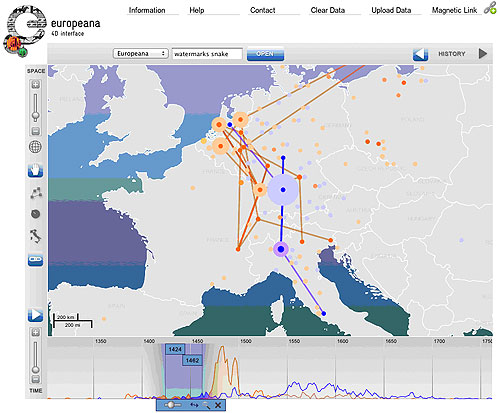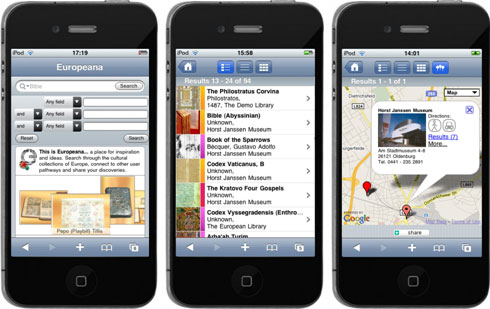|
 |
Results and resourcesFront end components - User-friendly interfacesEuropeanaConnect develops user-friendly interfaces.
Spatio-Temporal Interface - Europeana 4DAn intuitive spatio-temporal interface will allow users to browse the vast Europeana database in time and space. The Spatio-Temporal Interface is a web application that enables the synergy of geo-spatial and temporal context exploration of one or more topical queries simultaneously. We aim to enable the user to inspect the results of multiple queries in a geographic and historical context. We present an advanced time widget that shows a more detailed overview and allows more flexible selection of time ranges. Our advanced map widget prevents shown items from overlapping. Both widgets were extended to show multiple result sets allowing their direct comparison. Our ultimate goal is generating a web application that is used in conjunction with the search engine of Europeana and other search engines for digital libraries alike. Enabling users to search by time and location has meant the creation of a prototype of a spatio-temporal interface. It potentially provides a new visual access channel by combining spatial and temporal metadata for visualisation and allowing the creation of user generated interactive and generic maps of geo-elated tagged events, places and characters in Europe - combined with a timeline of the user's choice. To do this, it makes use of time-related and geographical metadata of the Europeana semantic layer which is added by using Geoparser. It is aimed at more academic users and is not deployed in the current Europeana user interface.
Spatio-Temporal Interface - Europeana 4D To enhance the reusability of the Europeana.4D implementation we looked for a well known and broadly accepted standard for data interchange. We have chosen KML, which was created by Keyhole, which later was acquired by Google. It is the basis for all geo related products by Google. In 2007 version 2.2 became a standard recognised by the Open Geospatial Consortium. Requirements and Specifications Requirements and specifications had to be formulated to describe the different needed tags, optional tags and several format related requirement that the implementation has to fulfill. Please note that this specification only defines a white list of elements that the implementation of Europeana.4D should recognize. For the handling of any other KML (including extension namespaces) please refer to the Section 'Requirements'. KML Specification KML Specification details the API on a technical level. It describes the internal (JavaScript), as well as the external HTTP based API. Visualisation Framework API Specification The purpose of this specification is an API documentation to ensure maintainability after the end of EuropeanaConnect. To make sure this goal is meet this document includes also the internal JavaScript API. A subset of this API will be later (as part of the second prototype) also be available as GWT based API. The second part of the document contains the important part in terms of reusability, the HTTP based interaction with external systems
Mobile ClientGiving users mobile access to Europeana is the second new access channel worked on. A generic mobile client, adapting to the capabilities and features of a user's mobile device has been developed and integrated in Europeana, allowing to search the Europeana database from a mobile device. Additionally, a rich client has been developed, enabling users to search for works inside Europeana around their current position. Also, basic navigation support has been included in the application, enabling users to find their way to the respective works on foot or by car. Further, it is possible to formulate advanced, faceted queries using the rich client, analogous to the Europeana web portal.
Mobile device interface
E-Books on Demand and Print on DemandAn E-Books-on-Demand service will allow users to order printed copyright-free books.
Relevant presentations
|


